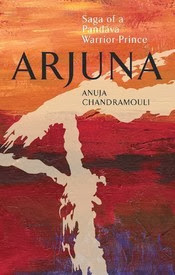I love reading books
on mythology and books centering on Ramayana and Mahabharata are my favorite.
There is something about these epic sagas that make them really interesting –
you see they are never too old or out of date. Today, I am here with the review
of yet another Ramayana centered book. It is ‘Rise of the Sun Prince by Shubha
Vilas’.
The cover is attractive, I must say.
This is another of
those book reviews that should have been here months ago. But, give it to
‘the-so-many-other-things’ in life, it got indefinitely delayed. And finally
today it is up here.
Title: Rise of the
Sun Prince, Book 1
Series: Ramayana: The
Game of Life
Author: Shubha Vilas
Publisher: Jaico
Publishing House
Publication Year: 2013
ISBN 13: 9788184955309
Binding: Paperback
Number of pages: 256
Price: Rs 250
The Blurb says:
“Ramayana: The Game of Life (Book 1), one of the world's
great literary masterpieces, skillfully retold for modern audiences. Epics like
the Ramayana have been recounted infinite times. Is there a need for another
chronicle in the presence of so many? How is this one different? And is it
relevant to our ever-changing modern lives?
Yes, there is a need, yes this is different and yes, it is relevant. This new
series of books, each following one khand of the Ramayana, decodes the eternal
wisdom of that poetic scripture through gripping narrative and
thought-provoking instruction. In the time-honored custom of spreading wisdom
through tales, every fascinating story in the epic is retold here and every
character unfolded to captivate your heart and open your mind to life's deepest
questions.
The narrative closely follows Valmiki's Ramayana, gently weaving in folk tales
as well as the beautiful analogies of the Kamba Ramayana. The first of this
six-volume series, Rise of the Sun Prince, takes you through the divine story
of Lord Rama from His birth up to His marriage. Through these pages are
revealed the tales of Dasaratha's leadership, Vishwamitra's quest for power and
the intriguing story of a little-known stone maiden. Ramayana: The Game of Life
has all of this and much more - food for contemporary thought drawn from an
enduring masterpiece.”
Any author who aims to
recount this epic saga must have tremendous courage, for this is a saga of epic
proportion that has been retold several times by several authors in different
ways. So, how does one present the same story to the readers in a new way and
grab their attention. Tough job it is!
Keeping that in mind,
I think the author has done a great job with his first book of the six book
Ramayana series. This one deals with the Bala Kanda of Valmiki Ramayana. One
gets to know how Valmiki starts to write the Ramayana, how Dasaratha came about
to have three hundred and fifty three wives, how all his sons were named, what
was Viswamitra’s role in Ramayana, the story of Ahilya and of course, every
tiny bit details about the lives of Rama & Sita. There is so much to know
and learn. When you read the book, you will realize that Ramayana is not just
about Rama & Sita or Rama’s war with Ravana – there is so much more to it.
The author is not just
recounting the story in this book; he is also revealing how the various lessons
that Ramayana imparts is of significance in our lives today. There are foot
notes on every page does the job. But, they are also the ones that often mar
the flow in the story. I am not a very big fan of this style, but I guess the
author was left with just this option. Sometimes, the foot notes were too long
and detailed that I almost forget where I left the story! I guess, keeping them
short, simple and to the point would be better.
Overall, it was a great
read. If you are a mythology books fan, you can surely pick this one.
Some pearls of wisdom from the book.
- “The vessel that holds
poison becomes equally poisonous. When you are angry at someone, remember, you
suffer the most.”
- “a past incident is
not what agitates the mind; it is the amount of attention we give it that
unsettles us.”
- “The circle of
indifference has the self at its centre. The circle of compassion has others at
the centre. The former leads to apathy; the latter to empathy.”
I received this book
from the author in exchange for an honest review.
Thank you for stopping
by! Cheers!









